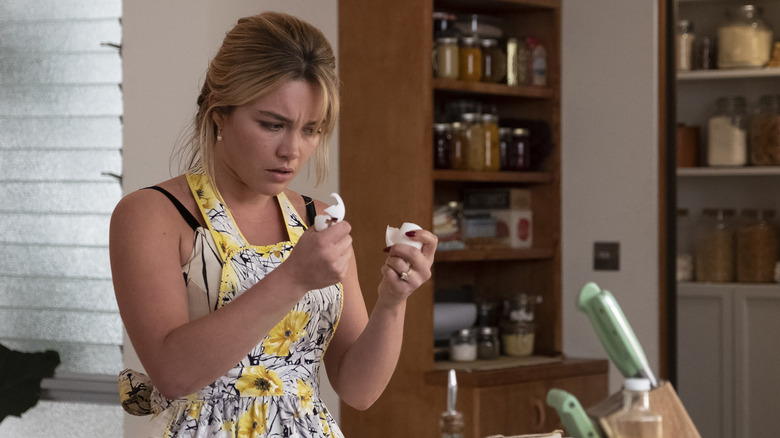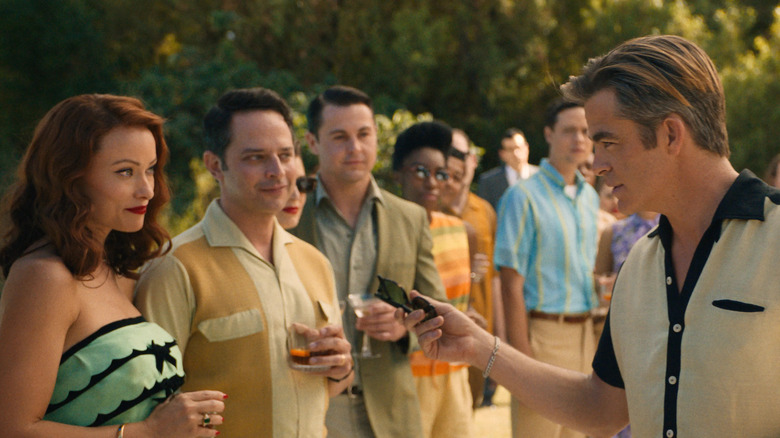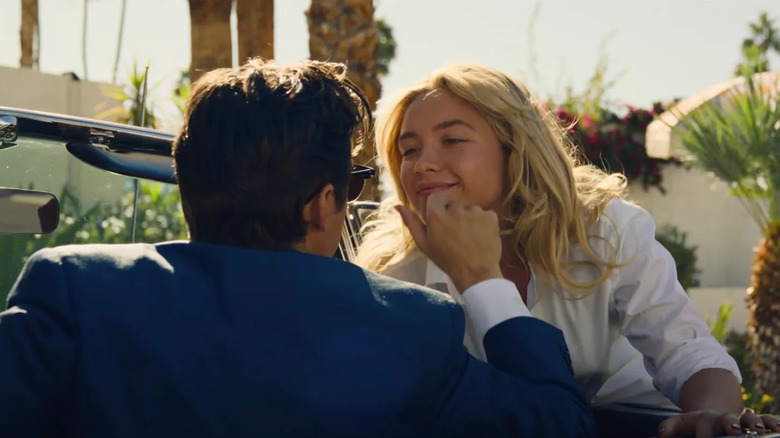Don't Worry Darling Review: Florence Pugh Saves Herself In A Stylish Thriller That Falls Short Of Its High-Minded Ideas
Florence Pugh is one of our finest working actresses today, particularly because she knows how to use her face like she's not saving it for later. Pugh's face will contort into a grimace, a manic grin, or a full-throated sob all within the span of a minute — which is what makes her so perfectly suited to playing women on the verge of a breakdown.
It's also what makes Olivia Wilde's highly anticipated sophomore effort "Don't Worry Darling" perfectly tailored to Pugh, who stars in the psychological thriller as a woman happily living in a suburban idyll with her loving husband (Harry Styles) ... until she starts to feel that something is wrong. Pugh is unsurprisingly immaculate as the slowly unraveling housewife, but as much as "Don't Worry Darling" tries to match her stroke for stroke, both in Wilde's many, many stylistic flourishes and in Katie Silberman's high-minded script, everything around Pugh manages to fall flat in comparison.
Based on a story by Carey Van Dyke, Shane Van Dyke — whose original spec script made the 2019 Black List — and Silberman, "Don't Worry Darling" follows Alice Chambers, a devoted housewife to Styles' Jack Chambers, a member of the cryptically named "Victory Project" headed by Chris Pine's charismatic leader, Frank. Every morning, the men of the Victory Project drive off to the isolated headquarters in the middle of the desert to work on the "development of progressive materials," while their wives lounge by the pool, attend ballet class, or go shopping in town. But they must never go beyond the town borders into the desert. And they must never, ever ask what their husbands do for a living.
Changing the world
It's clear right from the start that something is wrong with this sunny, suburban paradise. There are enough anachronisms that you can assume the people living in the Victory Project's '50s-esque town are clearly not from the '50s. The buildings regularly shake and tremble while the wives laugh it off as the "boys playing with their toys." Pine's serenely sinister Frank leads all the couples (because this town is almost exclusively populated with couples) in regular chants of how they're "changing the world." But in seeding those ominous touches of the uncanny right from the beginning, "Don't Worry Darling" plays its hand too early. It undercuts the gradual realization on Alice's part that her world is wrong — a misstep when you've got a talent like Pugh! — and it leaves the audience waiting for the inevitable reveal.
For its part, the build-up to that reveal is intriguing. Wilde litters the film with creepy imagery, shocks of violence, and split-second subliminal shots that serve to unnerve and convey just what Alice is going through. Fresh off the universal acclaim for her "Booksmart," it's clear that Wilde wants to show off her directorial chops, loading up the film with visual tricks and heaps of style. But the problem with keeping the audience waiting with bated breath is that these stylish flairs start to feel like empty air. At some point, the build-up to the mystery begins to feel like wheel-spinning, with long stretches of the film dedicated to other characters convincing Alice that she's losing her mind, Alice trying to convince herself she's not losing her mind, or Harry Styles dancing. The film weaves some interesting threads that promise to make the threat against Alice even more dangerous — mostly in relation to Pine's antagonistic dynamic with Pugh — that it kind of just drops.
Apart from Pugh — who is alternately fragile, steely, resilient, and shattered — the rest of the talented cast feels underused. Gemma Chan, as Frank's wife Shelley, sports the same serene and slightly sinister countenance as Pine, but the film feels like it sets up something more for her than ends up playing out. Wilde delivers a sharp, sardonic performance as Alice's best friend Bunny, while Nick Kroll, Kate Berlant, and Timothy Simons are dutifully vapid as the Victory Project residents who make up Alice's inner circle, though their comedy backgrounds leave them feeling slightly out of place. Perhaps the most underused is KiKi Layne's Margaret (given little to do apart from stand on roofs and sport a blank expression), the first housewife to "lose her mind," and whose violent spiral is what kickstarts Alice's own breakdown.
Maybe worry a little, darling
But let's get to the heart of "Don't Worry Darling," and the cause for much hoopla around the film: the love story between Pugh's Alice and Styles' Jack. Namely, their steamy sex scenes. Well, they sure are steamy, and Pugh and Styles (who, despite online rumblings, is perfectly fine in the role of a husband harboring a deep, dark secret) are both enthusiastic and game for all of them. But one part where the film starts to fall apart is when it mistakes Alice and Jack's sexual chemistry for emotional connection, resulting in a slightly disappointing narrative climax.
"Don't Worry Darling" has the misfortune of thinking itself to be smarter than it is. It has lofty ambitions of being a socially conscious psychological thriller (even at some using the kind of eerie imagery that feels reminiscent of that used by Jordan Peele in "Get Out") but it turns out it doesn't have much to say about its ultimate message. There are some things that can probably be said about how "Don't Worry Darling" tackles gaslighting, women's hysteria, incels, and the cult of personality, but it feels like the film only lightly touches on those subjects instead of actively interrogating them.
"Don't Worry Darling" wants to be a transhumanist "Truman Show," but ends up playing out more like a mostly okay episode of "Black Mirror." In fact, "Don't Worry Darling" recycles a bunch of ideas and imagery from other films, which it attempts to imbue with a fresh, new sociopolitical angle. But it can't overcome its rather simplistic story and a disappointing reveal that ultimately doesn't match up to its build-up.
/Film Rating: 6.5 out of 10


